Wednesday, December 13, 2023. Annette’s News Roundup.
I think the Roundup makes people feel not so alone.
To read an article excerpted in this Roundup, click on its blue title. Each “blue” article is hyperlinked so you can read the whole article.
Please feel free to share.
Invite at least one other person to subscribe today! https://buttondown.email/AnnettesNewsRoundup
___________________________
Joe is always busy.
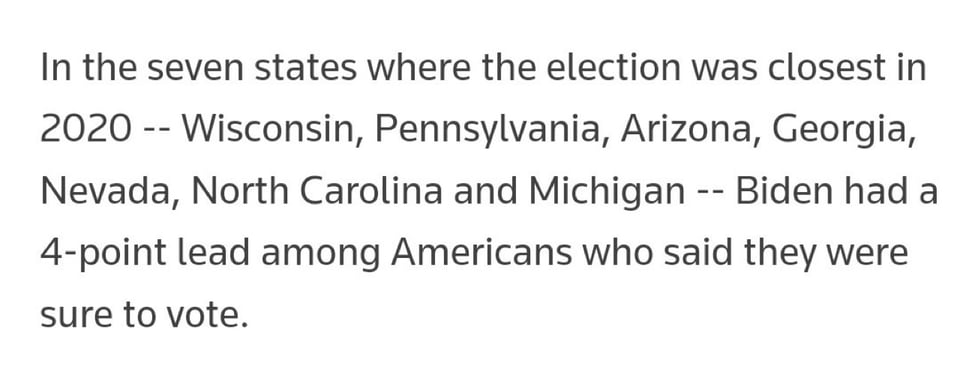
Mr. President, it's great to be by your side once again.
— President Biden (@POTUS) December 13, 2023
The American people – Democrats and Republicans alike – understand what happens when dictators don't pay a price for their death and destruction.
Congress must take action to continue our support for Ukraine. pic.twitter.com/wymfPCzGrt

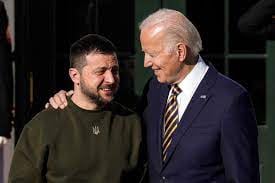
Today, we celebrate the 8th Anniversary of the Paris Climate Agreement – and nearly three years since America rejoined, signaling to the world that inaction wasn't an option.
— President Biden (@POTUS) December 12, 2023
Since then, we've set the U.S. on a historic course to tackle the climate crisis at home and abroad. pic.twitter.com/3CQDA8T9Wn
Legal and medical chaos in states like Texas is a direct result of Roe v. Wade being overturned.
— President Biden (@POTUS) December 12, 2023
Republican elected officials have imposed dangerous bans that jeopardize women’s health, force them to travel, and threaten doctors.
It's out-of-step with the majority of Americans.
From the New York Times - “Biden Warns Israel It Is ‘Losing Support’ Over War.”
The president’s words exposed a widening rift between his administration and that of Prime Minister Benjamin Netanyahu as casualties rise in Gaza.
President Biden told Israel’s leaders on Tuesday that they were losing international support for their war in Gaza, exposing a widening rift with Prime Minister Benjamin Netanyahu, who rejected out of hand the American vision for a postwar resolution to the conflict.
Mr. Biden delivered the blunt assessment of America’s closest ally in the Middle East during a fund-raiser in Washington, where he described Mr. Netanyahu as the leader of “the most conservative government in Israel’s history,” which doesn’t “want anything remotely approaching a two-state solution” to the country’s long-running dispute with Palestinians.
The president said that Israel had support from Europe and much of the world as well as the United States, but he added that “they’re starting to lose that support by the indiscriminate bombing that takes place.”
___________________________
An overview of what Jack Smith has done at the Supreme Court.
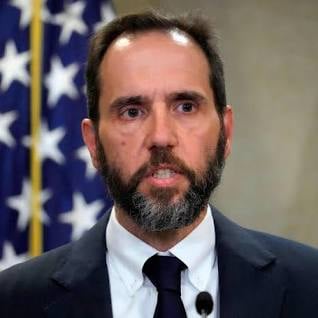
Why Jack Smith Is Taking Trump’s Immunity Claim Straight to the Supreme Court.
The special counsel has substantive and procedural reasons for wanting a quick ruling on whether Donald Trump can be prosecuted for his actions as president.
Jack Smith, the special counsel who has brought two cases against former President Donald J. Trump, made a bold move this week designed to undercut one of Mr. Trump’s chief defenses against accusations of plotting to overturn the 2020 election.
Mr. Smith asked the Supreme Court to rule on Mr. Trump’s attempts to have the election subversion charges dismissed on a sweeping claim of executive immunity before a lower appeals court even has the chance to consider the issue.
Mr. Smith also asked the justices to make their decision quickly.
“The United States recognizes that this is an extraordinary request,” he told the Supreme Court in a petition filed on Monday.
But there was a reason it was needed.
“This is an extraordinary case,” he wrote.
Here is a look at the intersecting legal and political issues surrounding the special counsel’s move.
What does Mr. Smith want the Supreme Court to do?
He made two separate requests.
First, he asked the justices to consider a legal issue they have never looked at before: whether the Constitution confers absolute immunity on a former president against a federal prosecution for crimes he committed while in office.
Mr. Trump put that argument at the center of his initial motion to dismiss the election case, which he filed in October in Federal District Court in Washington. He contended that because the charges were based on official actions he took while in the White House, the indictment in its entirety had to be thrown out.
But Judge Tanya S. Chutkan, who is handling the case, disagreed and rejected the motion two weeks ago. Mr. Trump’s lawyers challenged her decision in the normal way in front of a federal appeals court in Washington and also asked her to freeze the case while the appeal was being heard.
While the lawyers obviously hoped to win the appeal, they also had another goal: to drag out the process for as long as possible and postpone a trial on the election interference charges.
It was that delay strategy that appeared to underlie Mr. Smith’s second request to the Supreme Court. He asked the justices not only to rule on the immunity issue before the lower appeals court did, but also to do so on an expedited basis.
Mr. Smith told the justices that an ordinary, even a relatively fast, appeal could take too much time. And he expressed concern in particular about keeping the trial, now set to go before a jury on March 4, more or less on schedule.
What could happen if the trial is delayed?
It depends on whom you ask and how long the trial is postponed.
A significant delay could push the trial into summer or fall — the heart of the 2024 campaign season. That could cause problems for Mr. Trump because he would be obliged to attend the trial in Washington every weekday for two or three months when he could be holding rallies or meeting voters.
Mr. Trump would likely respond to such a situation by bringing his campaign to the steps of the federal courthouse. He would almost certainly hold daily news conferences in front of the television cameras that would await his exit from the courtroom and use them to deliver his political talking points and attack the legal proceeding. He has employed a similar strategy during the civil fraud trial in New York in which he is accused of inflating his company’s net worth.
There could also be serious consequences, however, if the trial is pushed off until after the election.
If that happens and Mr. Trump wins the race, he would suddenly have the power to order the charges to be dropped. Moreover, millions of voters would never get to hear the evidence that Mr. Smith’s team collected about Mr. Trump’s efforts to subvert the last election before making a decision about whether to elect him again.
What do we know about whether the Supreme Court will take the case on an expedited basis?
It would require only four of the nine justices to come together for Mr. Smith’s request to be granted.
Shortly after Mr. Smith filed his petition, the court issued an order telling Mr. Trump’s legal team to respond with their opinions on the issue by Dec. 20. While the schedule the justices set gave no indication of whether they might ultimately take the case, it did seem to suggest that the court was not inclined to drag its feet in reaching a decision.
Historically speaking, the Supreme Court has only rarely stepped in front of lower appeals courts by using the procedure known as “certiorari before judgment.” Before 2019, the court had not used the provision for 15 years, according to statistics compiled by Stephen Vladeck, a law professor at the University of Texas. But as of late last year, the court had used it 19 times since.
The procedure has been used in cases involving national crises, like President Richard M. Nixon’s refusal to turn over tape recordings to a special prosecutor during a criminal investigation.
Mr. Smith urged the court to use it in Mr. Trump’s criminal case as well, saying that the proceeding involved “issues of exceptional national importance.”
How sympathetic has this Supreme Court been to Trump in such cases?
While the court’s current majority has voted in favor of a number of staunchly conservative policies, from striking down abortion rights to reversing affirmative action, it has shown less of an appetite for supporting Mr. Trump’s attempts to monkey with the democratic process.
Just months before Mr. Trump appointed his third Supreme Court justice, the court ruled by a 7-to-2 vote in 2020 that he had no absolute right to block the release of his financial records from investigators in a criminal inquiry.
“No citizen, not even the president, is categorically above the common duty to produce evidence when called upon in a criminal proceeding,” Chief Justice John G. Roberts Jr. wrote for the majority.
That same year, in a brief unsigned order, the court rejected a lawsuit filed by the state of Texas seeking to throw out the election results in four battleground states that Mr. Trump had lost. It also declined requests to review suits filed by pro-Trump lawyers claiming that voting machines across the country had been hacked by a cabal of foreign actors to flip votes away from Mr. Trump.
Last year, the Supreme Court refused a request from Mr. Trump to block the release of White House records concerning the Jan. 6 attack on the Capitol, effectively rejecting his claims of executive privilege.
The court’s unsigned order upheld the original decision made in the case by none other than Judge Chutkan. And she had scathing words for Mr. Trump in her initial decision rejecting his claims of executive privilege.
“Presidents are not kings,” she wrote, “and plaintiff is not president.”
What could happen next?
If the Supreme Court takes the case and agrees with Mr. Trump’s immunity claims, then the indictment would be tossed out and there would be no trial on the election interference charges. But if the court hears the case and quickly sides with Mr. Smith, a trial would be held, likely before the election.
On the other hand, if the justices decline to hear the case at this stage, then it would go back to the U.S. Court of Appeals for the District of Columbia Circuit. But the Supreme Court could eventually come back into the picture and consider challenges to the decision of the appeals court. (New York Times).
___________________________
Harvard Got it Right.
From the Harvard Corporation yesterday morning.
Dear Members of the Harvard Community,
As members of the Harvard Corporation, we today reaffirm our support for President Gay’s continued leadership of Harvard University. Our extensive deliberations affirm our confidence that President Gay is the right leader to help our community heal and to address the very serious societal issues we are facing.
So many people have suffered tremendous damage and pain because of Hamas’s brutal terrorist attack, and the University’s initial statement should have been an immediate, direct, and unequivocal condemnation. Calls for genocide are despicable and contrary to fundamental human values. President Gay has apologized for how she handled her congressional testimony and has committed to redoubling the University’s fight against antisemitism.
With regard to President Gay’s academic writings, the University became aware in late October of allegations regarding three articles. At President Gay’s request, the Fellows promptly initiated an independent review by distinguished political scientists and conducted a review of her published work. On December 9, the Fellows reviewed the results, which revealed a few instances of inadequate citation. While the analysis found no violation of Harvard’s standards for research misconduct, President Gay is proactively requesting four corrections in two articles to insert citations and quotation marks that were omitted from the original publications.
In this tumultuous and difficult time, we unanimously stand in support of President Gay. At Harvard, we champion open discourse and academic freedom, and we are united in our strong belief that calls for violence against our students and disruptions of the classroom experience will not be tolerated. Harvard’s mission is advancing knowledge, research, and discovery that will help address deep societal issues and promote constructive discourse, and we are confident that President Gay will lead Harvard forward toward accomplishing this vital work.
The Fellows of Harvard College
Penny Pritzker, Senior Fellow
Timothy R. Barakett, Treasurer
Kenneth I. Chenault
Mariano-Florentino (Tino) Cuéllar
Paul J. Finnegan
Biddy Martin
Karen Gordon Mills
Diana L. Nelson
Tracy P. Palandjian
Shirley M. Tilghman
Theodore V. Wells, Jr.
One more thing. Or Two.
Claudine Gay and Fake Plagiarism Charge.
You may have heard some brouhaha about President Gay and plagiarism. This is part of a quite recognizable and familiar Right Wing strategy to taint their opponents with mud. Even if clean, the Right hopes you will come to see their opponent as dirty. They often pick on the opponent’s greatest strength. Hence, Presidential candidate John Kerry found himself on the defensive- answering challenges to his Silver Star, Bronze Star and 3 Purple Hearts for military service. This technique has a name - Swiftboating.
Here 👇 is what President Gay’s Ph.D. Adviser thinks of the plagiarism charges.
Harvard President Claudine Gay’s Thesis Adviser Shoots Down Plagiarism Accusation.
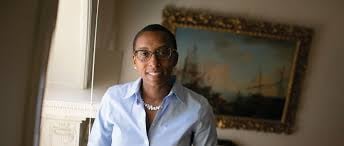
A high-profile conservative activist who almost single-handedly turned critical race theory into a national flashpoint has now accused embattled Harvard President Claudine Gay of plagiarizing “multiple sections” of her 1997 Ph.D. thesis—a claim which Gay’s own thesis adviser called “absurd” in an interview with The Daily Beast on Monday.
“There’s not a conceivable case that this is plagiarism,” said Prof. Gary King, who explained that Gay’s work underwent extensive review and never provoked even a suggestion of paragraph-pinching in more than a quarter-century. “Her dissertation and every draft I read of it met the highest academic standards.”
On Sunday evening, Christopher Rufo of the right-wing Manhattan Institute took to social media with what he termed “bombshell” evidence that Gay had lifted others’ work as her own while a doctoral student at Harvard. Rufo posted a long thread of side-by-side screenshots on X, formerly Twitter, of the alleged copycat passages, flagging language he deemed problematic.
Rufo called this “a direct violation of Harvard’s policy,” which reads: “When you paraphrase, your task is to distill the source’s ideas in your own words. It’s not enough to change a few words here and there and leave the rest; instead, you must completely restate the ideas in the passage in your own words. If your own language is too close to the original, then you are plagiarizing, even if you do provide a citation.”
Harvard officials and Gay did not respond to The Daily Beast’s requests for comment on Monday.
Gay’s dissertation, Taking Charge: Black Electoral Success and the Redefinition of American Politics, contains three instances of plagiarism, according to Rufo.
“In total, Gay borrows material from King in at least half a dozen paragraphs—all in violation of Harvard’s standard on academic integrity,” Rufo wrote.
But King, who served as Gay’s dissertation adviser and runs Harvard’s Institute for Quantitative Social Science, argued that the similarities between his work and his former student’s reflect Gay’s use of a unique and highly specific analytical approach King laid out in his book, A Solution to the Ecological Inference Problem.
“The book that she cites develops a complicated new statistical method, and it describes things in certain ways,” King told The Daily Beast. “It encourages scholars that use the method to describe things in those ways. That’s exactly the point of the book.”
King called Rufo’s claims Gay ripped off material from his book right under his nose in the dissertation “false,” “ridiculous,” and “absurd.”
Gay fell under fire following her Dec. 5 congressional testimony, during which she failed to clearly state that if Harvard students were to call for a genocide of the Jewish people, it would violate the university’s code of conduct. Amid widespread calls for her to step down, Gay later apologized in an interview with The Harvard Crimson, saying, “I am sorry. Words matter.”
In his Sunday-night tweet thread, Rufo highlighted two other examples of alleged plagiarism by Gay, claiming she swiped “an entire paragraph nearly verbatim from Lawrence Bobo and Franklin Gilliam’s paper, Race, Sociopolitical Participation, and Black Empowerment, while passing it off as her own paraphrase and language.”
Gay’s paragraph contains some similarities to the 1990 original by Bobo, who is now the dean of the Social Science Department at Harvard, and Gilliam, who is now the chancellor of the University of North Carolina Greensboro. In hers, Gay begins by citing Bobo and Gilliam by name, before going on to describe their research into “high-black-empowerment areas.”
Along the way, certain verbatim phrases that also appear in Bobo and Gilliam’s paper—”white counterparts of comparable socioeconomic status,” “contributing to a more trusting and efficacious orientation,” “greatly increasing black attentiveness to political affairs”—which Rufo argues should have been in quotation marks.
Gay “repeats this violation throughout” her dissertation, further plagiarizing Bobo and Gilliam, along with three others, Rufo and co-author Christopher Brunet allege in a companion article published on the Manhattan Institute website.
“I find myself unconcerned about these claims as our work was explicitly acknowledged,” Bobo told The Daily Beast via a spokesman late Monday afternoon.
Gilliam did not respond to a request for comment.
Rufo and Brunet further say Gay lifted material verbatim from political scientist Carol Swain, an author, professor, and Donald Trump superfan, all of which Rufo and Brunet say contravened Harvard’s standards on academic integrity.
Swain bashed Gay on Twitter, while suggesting uncredited use of her work is hardly uncommon.
“She would not be the first one,” Swain complained in a quote tweet of Rufo. “The practice among some academics white and black has been to use my work and never cite me.”
However, the snippet of Gay’s dissertation Rufo featured in his tweet in fact includes an in-text citation of Swain’s work.
But Darren Hick, a philosophy professor at Furman University, isn’t quite ready to give Gay a pass, he told The Daily Beast.
“Plagiarism is an institutional offense, and if Harvard’s policies in 1997 were the same as they are now, then yes, this looks like plagiarism,” said Hick, who recently gained a degree of fame after warning about students using AI to cheat without getting caught.
Rufo and Brunet say Harvard “should conduct a full investigation into Claudine Gay’s academic integrity,” and argue that any student caught doing the same thing would be punished “up to and including” expulsion.
“The same standard should apply to the university president,” they write.
Yet, according to Tilman Roschinski, an international risk analyst and open-source researcher who has investigated bogus and inflated credentials across various industries including academia, Rufo and Brunet are “clearly exaggerating” their findings.
Roschinski reviewed Gay’s thesis and said he spotted missed citations that “definitely need correcting,” but that what’s there “doesn’t look like a deliberate effort to deceive anyone,” and is therefore “far from needing any formal investigation.”
“There are bound to be such errors in many dissertations,” Roschinski told The Daily Beast. “A proper investigation here would need to look at all of the other PoliSci dissertations around 1997-1998. What do they look like? One would need a much more thorough review to judge this properly, but what's in her thesis doesn't really strike me as worthy of that effort.” (The Beast).
A reminder too…
President Gay has received two major prizes for her scholarship without a hint of complaint about plagiarism - the Anna Laura Myers Prize for best undergraduate thesis in economics at Stanford, and the Toppan Prize for the best Ph.D. dissertation in political science.
A man who considers himself master of the universe caused much of this trouble. What a petty human being.
Bill Ackman’s Campaign Against Harvard Followed Years of Resentment.
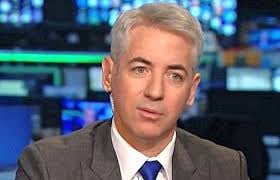
In the two-month battle over the fate of Harvard’s president, the billionaire investor William A. Ackman has cast himself as a protector of Jewish students and the standard-bearer for people who believe colleges have fostered a hostile atmosphere for critics of liberal orthodoxy.
But behind his anger are personal grievances that predate the uproar that has engulfed campuses since the Oct. 7 attack by Hamas on Israel and Israel’s subsequent invasion of Gaza. Mr. Ackman, by his own admission and according to others around him, resents that officials at his alma mater, to which he’s donated tens of millions of dollars, and its president, Claudine Gay, have not heeded his advice on a variety of topics.
Most recently, this includes how to respond to complaints of antisemitism and the specter of violence against supporters of Israel on campus.
“It would have been smart for her to listen, or to at least pick up the phone,” Mr. Ackman said in an interview, describing a recent outreach to Dr. Gay that was part of a stream of calls, texts and letters to university officials.
Mr. Ackman, who posts frequently on social media to nearly one million followers, stands virtually alone among high-profile donors to Harvard in making himself a public adversary of the school. Other wealthy Harvard donors like the financier Kenneth Griffin have pressed their perspectives only behind the scenes.
The president of the University of Pennsylvania, M. Elizabeth Magill, resigned this weekend amid organized pushback from high-profile alumni of the school. Ms. Magill, Dr. Gay and Sally Kornbluth, president of the Massachusetts Institute of Technology, set off a furor at a congressional hearing last week, when they seemed to evade questions about whether students should be disciplined if they called for the genocide of Jews.
“I don’t think we would have seen anything nearing the level of backlash against these institutions had it not been for Bill Ackman,” said Chris Rufo, senior fellow of the conservative Manhattan Institute for Policy Research, an outspoken critic of university diversity programs and topics like critical race theory. Mr. Rufo praised the hedge fund manager as an “elite defector,” a sentiment shared by a half-dozen Harvard donors who said they supported Mr. Ackman’s aims but were reticent to speak publicly and damage their relationship with the school.
There are others who disagree. Ben Eidelson, a professor at Harvard Law School, described Mr. Ackman as “an interloper.” “We can’t function as a university if we’re answerable to random rich guys and the mobs they mobilize on Twitter,” he said.
Mr. Ackman, 57, has an estimated fortune of $3.8 billion, according to Forbes, and a history of donating to Democrats. He founded the hedge fund Pershing Square Capital and for years waged high-profile, drawn-out battles against companies he believes to be mismanaged. He lost a billion-dollar bet against the nutritional food supplement company Herbalife, which he called an outright fraud — allegations that were never proven. At the start of the Covid-19 pandemic in 2020, he made $2.6 billion wagering that the stock market would drop.
In recent years, Mr. Ackman has also frequently weighed in on hot-button public issues, including the pandemic, Russia’s attack on Ukraine, the cryptocurrency exchange FTX, the collapse of Silicon Valley Bank, the presidential campaign of Robert F. Kennedy Jr. and the various goings-on around Elon Musk.
Key to Pershing Square’s playbook, which Mr. Ackman seems to have adopted in his battle against Harvard, is a commitment to go to great lengths to pressure companies to bend to his will.
He has given tens of millions of dollars over the years to Harvard, but does not rank among the top donors at a school that has landed numerous nine-figure donations. His largest gift dates to 2014, when he and his former wife announced a $25 million donation to expand the economics department and endow three professorships.
More recently, he gave a smaller sum to the rowing crew, a team he joined as an undergraduate.
But interviews with him and 10 associates revealed a gradual degradation of the relationship with his alma mater.
In the interview on Monday, Mr. Ackman recalled that a little over a year ago, Dr. Gay, who at the time was dean of Harvard’s Faculty of Arts and Sciences, paid a visit to his waterfront Manhattan office. The topics of discussion included Mr. Ackman’s plans to donate more money.
The 45-minute chat was pleasant, he recalled, and so he expected that she might be receptive to his input roughly two months ago, when he called her to discuss his concerns about the danger to Jewish students after the deadly Oct. 7 attack in Israel, and his disappointment in the university’s official response to it.
Dr. Gay forwarded his message to Penny Pritzker, leader of Harvard’s governing board, who engaged Mr. Ackman in what he described as “an entirely disappointing conversation.” Ms. Pritzker did not respond to requests for comment.
Mr. Ackman has privately steamed at Harvard over at least the past three years, several people who have discussed the subject with him say, in part after the university’s administration brushed off his suggestions for how to set up a testing lab to get students and staff back to campus during the pandemic.
Two years ago, in an incident not previously reported, Mr. Ackman told members of Harvard’s fund-raising team he might not give another dime because they hadn’t heeded his advice on how to invest an earlier donation, said two people with knowledge of the exchanges. Mr. Ackman sent off a series of fiery letters to Harvard administrators questioning their financial acumen. He wound up donating more money anyway.
Asked about that episode, Mr. Ackman said it was “a distraction from other things” and declined to answer questions about it. A Harvard spokesman declined to comment on school’s interactions with Mr. Ackman.
Mr. Ackman compared the university’s lack of engagement with him to companies he targeted in his early days as an activist investor pushing for changes. Then, he would call chief executives and wouldn’t get his calls returned. Now, he said, it’s more common for corporate boards to invite him in.
On Nov. 4, he wrote a four-page letter to Dr. Gay, outlining his concerns about antisemitism on campus and what he called double standards on campus for different racial and ethnic groups. He offered a detailed list of actions he wanted the university to take.
After sending that letter, he said he had minimal contact with Harvard. He continued to raise questions about Dr. Gay on social media and in public forums, including by promoting claims that Dr. Gay had plagiarized academic research.
Harvard’s board said that Dr. Gay had not violated the school’s standards for research misconduct, but that she would retroactively add additional citations and quotations to earlier research.
Another billionaire financier agitating for change at an elite university, the private-equity mogul Marc Rowan, tried a different tack. Mr. Rowan, who headed the board of advisers at the University of Pennsylvania’s Wharton School, had been publicly calling for the ouster of the university’s president, but last week told associates that he was stepping back, worried it could do more harm than good to associate the effort with a wealthy Wall Street investor, people briefed on the conversations said.
Even some of Mr. Ackman’s supporters said in interviews that they wished he had heeded the same advice, though they didn’t want to be named for fear of becoming Mr. Ackman’s target themselves. Mr. Ackman said that a more demure approach wasn’t an option, as he had no formal role on any Harvard boards. “They didn’t let me in,” he said.
Mr. Ackman, who was criticized after he sought to identify students in groups that blamed Israel for the Hamas attack, said he doesn’t give much thought to his detractors.
“For every email I’ve gotten saying, ‘You’re a racist.’ I’ve gotten 1,000 people saying, ‘What you’re saying is what I believe’,” he said. “I’ve gotten calls from some of the most prominent people in the world who said, ‘I wish I could say what you’re saying.’”
He said he will continue to share his concerns with Harvard’s administration and others at the school. He also predicted that others would continue to mine Dr. Gay’s academic record. “I don’t see a scenario where she survives for the long term or intermediate term,” he said on Monday.
He declined to comment Tuesday on the news that Dr. Gay would keep her job. (New York Times).
Marc Rowan is the Ackman counterpart at the University of Pennsylvania, a Billionaire who thinks he knows everything -
Maybe someone should ask Rowan if he is so smart, how did he choose to partner with Leon Black who paid millions to Jeffrey Epstein?
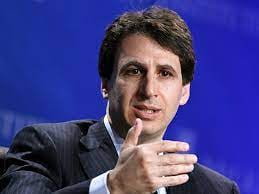
“Today, unelected trustees with no academic expertise are evidently attempting a hostile takeover of the core academic functions of the University of Pennsylvania — functions related to curriculum, research, and the hiring and evaluation of faculty,” the group’s executive committee wrote. “The questions being considered by the trustees represent an assault on the principle of academic freedom, which was first articulated a century ago to safeguard the educational mission of universities.” (Philadelphia Inquirer).
___________________________
That Ron DeSantis really had it on the ball, attacking universities before it was fashionable to do so in the MAGA world.
Florida's university system under assault during DeSantis tenure, report by professors' group says.
A report by a professors' group says academic freedom and independent governance have been under political and ideological assault in Florida’s university system during the tenure of Florida Gov. Ron DeSantis.
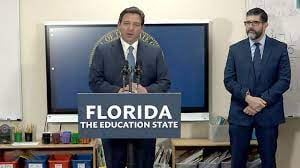
TALLAHASSEE, Fla. -- Academic freedom and independent governance have been under political and ideological assault in Florida's university system during the tenure of Florida Gov. Ron DeSantis, according to a report by the American Association of University Professors released this month.
The threat to Florida's higher education system accelerated this year with the takeover of New College of Florida in Sarasota by partisan DeSantis supporters, according to the report from an AAUP committee.
New College has become a focal point of a campaign by DeSantis, a candidate for the 2024 Republican presidential nomination, to rid higher education in the state of what he calls left-leaning “woke” indoctrination on campuses.
Additionally, the appointments of GOP politicians to the boards that govern Florida's higher education system have made them compliant to the wishes of the Republican governor, the report said.
A veteran University of Florida faculty member told the AAUP committee that previous board members, regardless of party, understood their role to be ensuring that the universities they led were thriving. But the current group “are concerned principally with their relationships with the governor,” the report said.
“At the same time, recent legislation has expanded the power of the board of governors and, to a lesser extent, of local boards of trustees to dictate policies to campus administrations and faculties,” the report said.
Adding to the concerns about Florida's higher education system is a new law passed this year by the Republican-controlled Legislature which requires a review every five years of tenured professors and forces state universities to be accredited by a different agency each accreditation cycle, the report said. Tenured professors traditionally have been given indefinite academic appointments to promote academic freedom, but conservative officials in red states across the U.S. have been reviewing whether there should be limits.
An email seeking comment was sent to the Florida Department of Education. (Associated Press).
___________________________
A Big Win that may give Democrats the House in 2024.
New York's high court orders new congressional maps as Democrats move to retake control of US House.
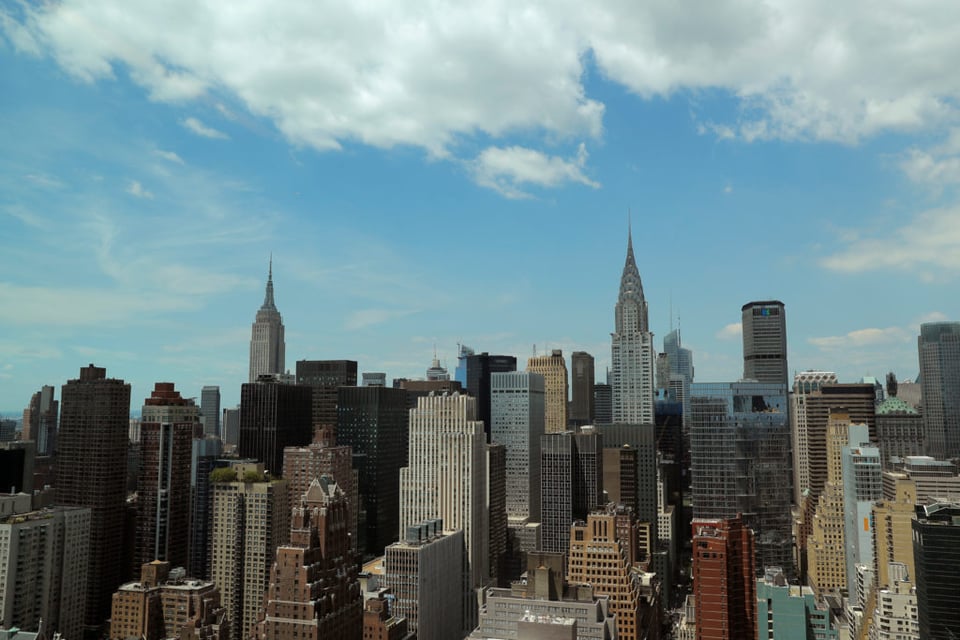
ALBANY, N.Y. (AP) — New York’s highest court on Tuesday ordered the state to draw new congressional districts ahead of the 2024 elections, giving Democrats a potential advantage in what is expected to be a battleground for control of the U.S. House.
The 4-3 decision from the New York Court of Appeals could have major ramifications as Democrats angle for more favorable district lines in the state next year. Republicans, who won control of the House after flipping seats in New York, sought to keep the map in place.
The state’s bipartisan Independent Redistricting Commission will now be tasked with coming up with new districts, which will then go before the Democrat-controlled Legislature for approval. The court ordered the commission to file a map no later than Feb. 28.
“In 2014, the voters of New York amended our Constitution to provide that legislative districts be drawn by an Independent Redistricting Commission,” Chief Judge Rowan D. Wilson wrote for the majority. “The Constitution demands that process, not districts drawn by courts.”
The ruling is an early, but important, step in Democrats’ plans to retake a handful of congressional districts in New York seen as vital to winning a House majority.
“Today’s decision is a win for democracy and particularly the people of New York. We are eager for the Independent Redistricting Commission to get back to work to create a new, fair congressional map – through the process New York voters intended,” said U.S. Rep. Suzan DelBene, chair of the Democratic Congressional Campaign Committee.
Democrats sued to have last year’s maps thrown out after their party lost seats in the New York City suburbs and handed control of the House to Republicans.
The case came after Democrats in the state bungled the redistricting process for the 2022 elections, and along with what many considered political miscalculations at the top of the state ticket, drew blame for the party’s loss of the House.
The maps used last year were supposed to be drawn by the state’s independent redistricting commission. But the commission, which is made up of an equal number of Democrats and Republicans, failed to reach a consensus and eventually gave up.
The state Legislature then stepped in and drew its own map, which was set up in a way to give Democrats a major edge by cramming Republican voters into a few super districts, diluting GOP voting power in the rest of the state. A legal challenge stopped the Democrats’ map from moving forward and the Court of Appeals ruled that the state didn’t follow proper procedure in adopting the maps.
Instead, the court had an independent expert draw a new set of lines that, along with strong turnout from the GOP, led to Republicans flipping seats in the New York City suburbs and winning control of the House in 2022.
Democrats then filed their own lawsuit to stop last year’s maps from being used in 2024, with the case going all the way to New York’s highest court. They argued that the court-drawn map was never meant to be used in more than one election and that the state’s bipartisan redistricting commission should have another opportunity to draw the maps.
Republicans have argued the districts are politically balanced and should not be discarded.
“We are disappointed but not surprised by the Court’s decision to allow Democrats a second attempt at gerrymandering the maps,” said Savannah Viar, spokesperson for the National Republican Congressional Committee. “Instead of focusing on policies that appeal to everyday voters, Democrats are trying to cheat their way to power.”
Democrats have dedicated major financial and campaign resources to retake districts in New York next year. Republicans are aiming to hold onto the seats, focusing on issues such as crime and the arrival of migrants that they hope will animate suburban voters.
Still, the redistricting process is far from over. A new map will likely result in another legal challenge, with the commission’s work closely watched by both Republicans and Democrats.
“We’re going to have a very busy holiday redistricting season to have maps ready by February,” said New York Law School professor Jeffrey Wice, who focuses on redistricting. (Associated Press).
___________________________
Hey, look what is happening at the National.
National Theater, Source of Broadway Hits, Gets Its First Female Leader.
Indhu Rubasingham will lead the venerable London institution where plays including “War Horse” and “The Lehman Trilogy” originated.
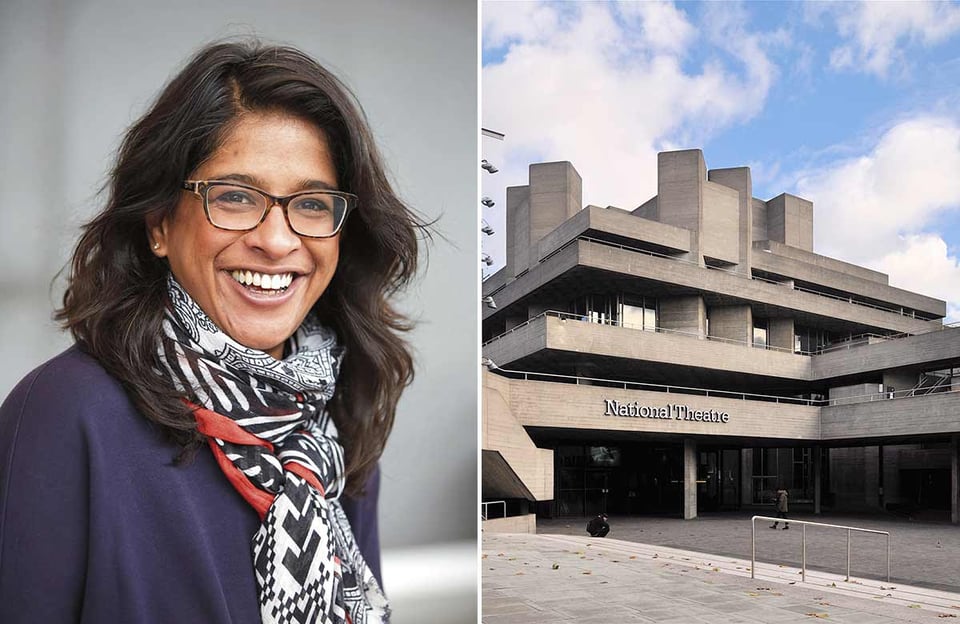
Since the National Theater opened in London in 1963, its artistic directors have been among the greats of British theater: Laurence Olivier, Peter Hall, Richard Eyre, Trevor Nunn, Nicholas Hytner and Rufus Norris. They also had two other things in common. All six are white men.
On Wednesday, the theater brought that era to an end when it announced the appointment of Indhu Rubasingham to the top position. She will be the first woman and person of color to lead the National Theater.
Rubasingham, 53, will join next spring, the theater said in a news release. She will work for a year alongside Norris, who is departing, before taking sole charge in spring 2025, when she will also share the role of chief executive with Kate Varah, the theater’s current executive director. That sharing of responsibilities is a change for the theater, where Norris currently holds both roles.
With three theaters in its building alongside the River Thames, the National, as it is known, stages around 20 plays and musicals each year, and has almost 900 full-time employees. Critics and theatergoers expect it to produce the best new shows and revivals in London, while also staging work that comments on the state of the nation. On top of that, it is tasked with incubating new talent, mounting touring productions across Britain and running an extensive education program.
Rubasingham will have to do all of that in the face of a shrinking budget and soaring inflation. Many theaters in Britain, including the National, receive annual government grants meant to cover about a fifth of their operating costs, but the amount of those subsidies is declining. Last year, Arts Council England, the funding body, slashed the National’s subsidy by 5 percent, to 16.1 million pounds (about $20 million), as part of a drive to reallocate grants to institutions outside London.
Beginning in fall 2024, the National will face further budgetary pressure when it has to start repaying a loan worth about $25 million. Britain’s government lent the theater the money during the coronavirus pandemic to help the shuttered institution shore up its finances.
Rubasingham will be expected to produce money-spinning transfers to both the West End and Broadway. Over the past decade or so, the National’s transfers to New York have included “War Horse,” “The Curious Incident of the Dog in the Night-Time” and “The Lehman Trilogy.” Next year, it is sending “The Effect,” a recent hit, to The Shed.
At the much smaller London playhouse that she currently leads, the Kiln, Rubasingham has directed several hits that have found their way to New York, including “Red Velvet,” about the experiences of an African American actor in 19th-century London, which played at St. Ann’s Warehouse in 2014, and Zadie Smith’s “The Wife of Willesden,” which recently played at the Brooklyn Academy of Music. Her programming at the theater, which changed its name from the Tricycle to the Kiln under her leadership, included acclaimed shows like “The Father,” “The Mother” and “The Son” from Florian Zeller’s trilogy, and works by emerging playwrights.
Born in the northern English city of Sheffield to Sri Lankan Tamil parents, Rubasingham has said in interviews that as a teenager she expected to become a doctor until she accepted a work experience placement at the Nottingham Playhouse, a regional theater. She studied drama at Hull University and then worked as a trainee director at the Theater Royal Stratford East in London, where she worked with Mike Leigh, the movie director.
Even with a lengthy track record at the Kiln, the National appointment is a huge step up. Clint Dyer, the National Theater’s deputy artistic director, outlined the challenges of running the organization in a recent interview with the Times of London. Whoever got the top job, he said, needed to have the “experience, understanding, empathy, desire” and “forward thinking” required to run any major arts institution, but also “the knowledge of the canon, of new playwriting and the ability to speak to donors, to government, to people like me.”
“It’s a herculean task,” Dyer said. (New York Times).
___________________________